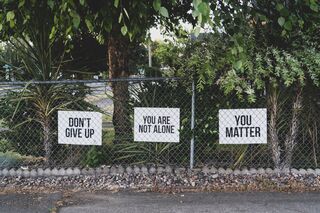Suicide
4 Ways to Deal With Loss of a Child to Suicide in Recovery
How I maintained my sobriety after the suicide of my 15-year-old daughter.
Posted August 13, 2020

This is an area of my life that I never thought I would have experienced. I am a parent who not only lost a child at a young age but also lost them to the tragedy of suicide. How does one deal with this when it happens?
The one thing I have come to realize is just how many children choose this path because they have no other choice but to end their life. The other thing I have come to realize is just how close I came to giving up on everything that was important to me and my life. This is a part of my life that I will never have an answer for. What I mean by this is, if my child had died of an illness or by a tragic accident, at least I would have some sense of closure. With this, I do not have any answers, only questions.
On August 20, 2018, my 15-year-old daughter committed suicide. It was something that to this day has kept me in a whirlwind, and a lot of times has tested everything I have believed in. When this happened, I was, at the time, over 26 years into long-term recovery, and I never wanted to go back to my addiction so badly. If I had been within the grasp of alcohol that night, I think there was a strong possibility I would have given into my demons. I consider myself blessed I did not give in to the temptation of addiction, and I am proud to say that I am still active in my recovery. I am closing in on 29 years.
So how was I able to keep from going back and using alcohol? I will tell you this was my greatest battle to date. Don’t get me wrong, there have been numerous occasions over the past three decades on which I could have forgotten everything and given in to my inhibitions to want to drink, but none of them compared to losing my daughter. I knew if I was to be able to continue my recovery, I would need several things to keep me stable and to not go back to the darkness of addiction.
1. Do not isolate yourself.
The first thing I did to keep from falling into my addiction was to not isolate myself. There are so many times in the life of a person with substance use disorder that they can easily give up and give in to the temptation of substance use when something negative happens in their life. For me, I had to tell several people that were there with me when my daughter died to not leave me alone. I knew what I was capable of doing and all my thoughts revolved around numbing the pain by any means necessary. For me, that was by drinking alcohol.
I told those who were closest to me that I wanted a bottle of Jack Daniels and a bottle of Jim Beam and I wanted the boys to meet. This is the reason that I could not be left alone, because had I been left to my own devices, I would have given in.
2. Rely on the skills you have learned in life.
The next thing I had to do was to rely on every skill I had as a counselor. I had to dig into my resources to find alternative ways to deal with the pain I was experiencing. There are a lot of skills I teach clients with whom I work to help them deal with the urges and the cravings. Now, I must utilize these same skills in my own life and allow them to help me maintain focus on the things that will keep me sober. Some of the skills I used were removing myself from negative situations and seeking out the guidance of other professionals, especially those who specialize in grief.
3. Do not dwell on the past or bottle things up.
The next thing I had to do was to do things that did not allow my mindset to dwell on the tragedy. A lot of times, when a person with substance use disorder finds themselves in the predicament of dwelling on the past, that is when they can easily start to seek out anything that will bring them excitement. For a lot of people with substance use disorder, that comes in the form of alcohol and/or drugs.
For me, I have continued to put my thoughts on paper. I can no longer keep them bottled up for the fear of exploding at the wrong place and time and towards the wrong individual. If you are a male, you have the tendency to not want to express yourself, and this is where being able to journal or write your thoughts comes in handy. It allows you to vent, instead of getting frustrated to the point of wanting to go back to what makes you comfortable.
4. Find positive hobbies to help maintain your recovery.
Another thing that has helped me maintain my recovery, especially over the past two years, is attending car shows. This has allowed me to not only show off my 1966 Mustang but also to talk about my daughter with others and bring awareness to mental health issues and suicide, especially in the youth of today.
Doing these things in my life has kept me from going down that dark and dangerous path of addiction. All I can tell you is that if you fall into the depths of addiction, it will take you farther than you ever wanted to go, make you do things that you were not meant to do, and make you the person you never wanted to become. I will have to again note that I am blessed to not have relapsed when my daughter died, and I am grateful I have had the love and support of my family and friends.
If you know anyone that is contemplating harming themselves or is having negative thoughts of suicide, please have them contact the National Suicide Hotline at 1-800-273-8255.
This post is dedicated to the memory of my daughter, Kayla Deann Rounds (2/20/2003-8/20/2018).
Taking recovery one day at a time (10,450 Days and Counting).




